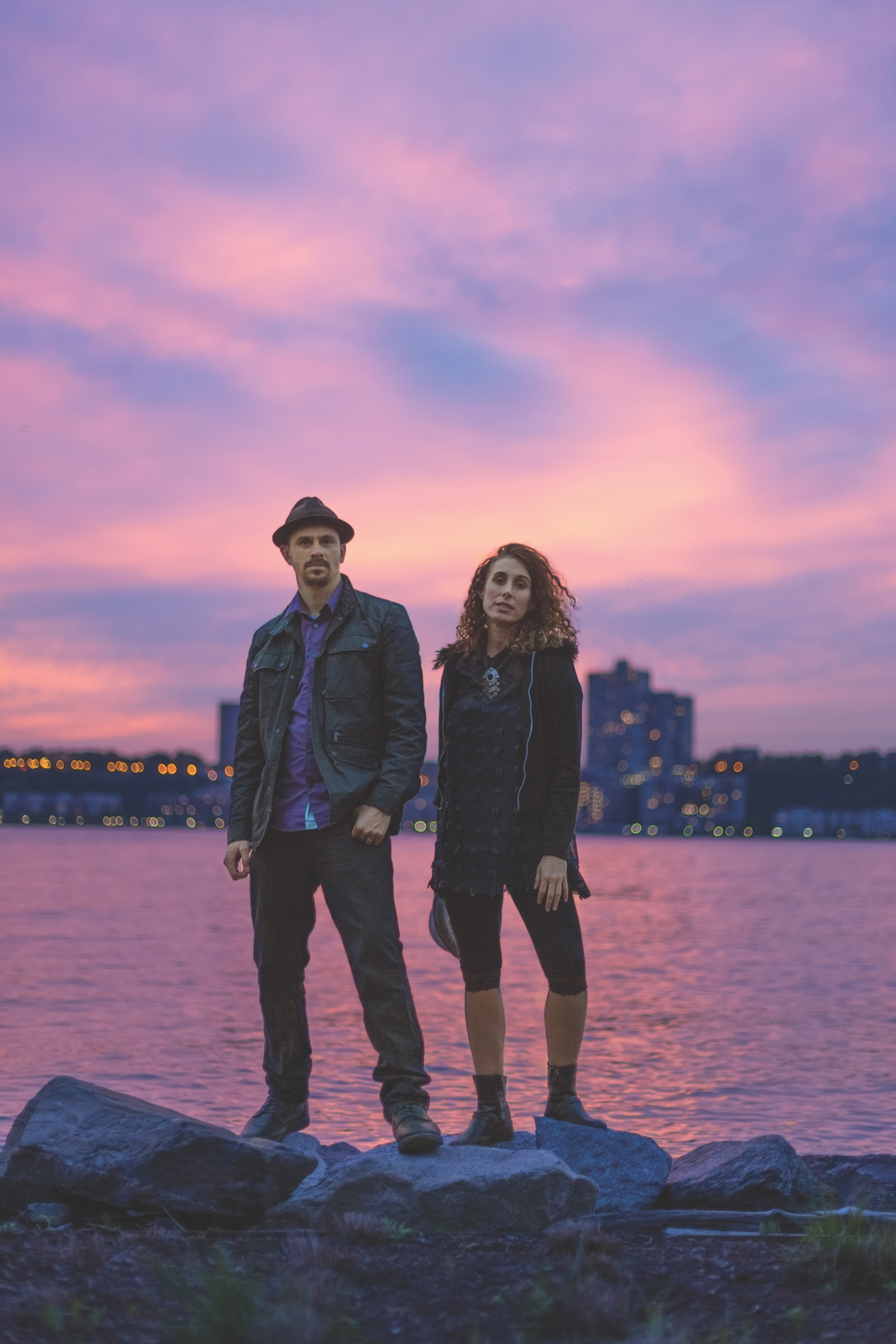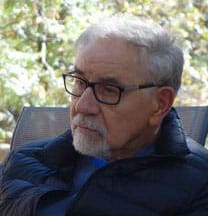 Eden Pearlstein and Basya Schechter make up Darshan. Photo courtesy of Darshan
Eden Pearlstein and Basya Schechter make up Darshan. Photo courtesy of Darshan What happens when two Jewish musicians shaped by different life experiences come together to create a 21st-century take on Kabbalat Shabbat?
The result is “Raza,” a recording released digitally in November and on CD this month, that transforms traditional Friday night prayers and poetry — Psalms, Song of Songs, “L’Cha Dodi,” “Yedid Nefesh” — into an album that can be enjoyed for its cutting-edge musicality as well as its elements of traditional sacredness.
Basya Schechter, a vocalist and instrumentalist, has teamed up with Eden Pearlstein, a hip-hop rapper, to form a group called Darshan — seeker, in Hebrew. Schechter’s ancient Hebrew and Aramaic chants on “Raza” are haunting, and her soulful cantorial singing is juxtaposed with Pearlstein’s urban-inflected English rap lyrics, roughly based on traditional liturgy.
“The lyrics are not translations or even paraphrases of traditional poems and prayers sung during Kabbalat Shabbat, but instead offer a conversation with these venerable texts, reimagining their original spirit in a modern poetic idiom,” Pearlstein told the Journal.
Pearlstein’s rap lyrics are high-speed and sometimes obscure, as poetry often is. To absorb them, they need to be heard more than once, and each subsequent listen yields more meaning.
Schechter was born into an ultra-Orthodox family in Borough Park, Brooklyn. As a young adult, she was sent to a Jerusalem yeshiva for a year, in her words, “to become even more frum.”
It didn’t work out that way.
“We were both stirring the pot with the raw materials of the text, but just as important, we were both receiving aha! moments from the text and from each other.” — Eden Pearlstein
Jumping headlong into Israel’s secular attractions, Schechter crossed the yeshiva’s red lines and was expelled. She then journeyed widely in the Middle East, Africa, Latin America and Europe. Upon her return to New York, she integrated into her music the multicultural inspiration she had absorbed and enriched her captivating voice.
In subsequent years, she recorded avant-garde music under the name Pharaoh’s Daughter, reconnected with Judaism via Reb Zalman Schachter-Shalomi’s Renewal movement, and became an ordained cantor, which she still is.
The other creative force behind Darshan, Pearlstein, is in his late 30s and was born into a Reform family in Phoenix. After his bar mitzvah, he had little interest in Judaism. He attended college in Olympia, Wash., where he remained for years, becoming a popular underground hip-hop artist by the name of EPrhyme — pronounced e-prime. Looking to deepen his rap style, he delved into prayers and songs by 16th-century Kabbalists and fell in love with their mystical writings. The experience also led to Pearlstein’s return to Judaism.
One day, while sifting through CDs at a music store, Pearlstein came across the songs of Pharaoh’s Daughter and was enthralled by Schechter’s vocalizations. Pearlstein realized that Jewish songs and prayers, whether from the Bible, the Zohar, or composed by 16th-century mystics, could be blended with his hip-hop lyrics and cutting-edge sounds.
Years later, after Pearlstein had moved to New York, he went to a Jewish retreat center in Connecticut and was delighted to learn that one of the musicians offering workshops, in Jewish music and songwriting, was Schechter. He sat in on a group and met the woman whose singing and song-writing had shown him the nexus between his art and Judaism.
“I ended up driving her to the train station after the retreat,” Pearlstein said.
Their connection continued in New York, where they talked about writing songs together. They gravitated to Kabbalat Shabbat as a source for their creativity because Pearlstein had become Orthodox and Schechter had become a cantor at Romemu, a Renewal synagogue in Manhattan’s Upper West Side, and at Fire Island Synagogue.
“Kabbalat Shabbat is a good fit for us,” Pearlstein said. “It just so happened that [Basya] had a summer job as a cantor in Fire Island, and she invited me and my wife out there. So we went. And Basya said, ‘OK, I invited you as a friend, but we can’t have you out here in Fire Island and not use you at all — you have to do something with the community.’ So, we decided upon using the liturgy of Kabbalat Shabbat.
“[Basya] had the melody for one of the songs picked out, a melody she had already composed. So she starts playing it over and over, and I just start rapping, and by the time the sun was going down and it was time for services, we’d finished the first draft of a song.
“We went directly into the shul and performed it in its rough state, and shared it with the community. It felt wonderful, the community loved it. … And we ended up writing the whole album that way. Every song, except one, was written on Fire Island over the course of two years.”
“As soon as Eden would arrive [at Fire Island] on Fridays,” Schechter told the Journal, “we’d start working. I’d sing melodies and he’d rap his new commentaries. And then we’d go into the shul and the congregation would respond.”
Pearlstein said he and Schechter would “sit with the text and study it together, sometimes for hours. … We’d look at the commentaries and midrashes and have our own discussions. We’d look at kabbalistic teachings, anything we had at our disposal, and just imbibe the text. Then we’d go right into composition and writing. So we were both stirring the pot with the raw materials of the text, but just as important, we were both receiving aha! moments from the text and from each other, so by the time we got to our creative process, we were on fire.”
During the production of “Raza,” Schechter and Pearlstein brought the album’s producer to Fire Island and recorded there, using the Fire Island Synagogue’s choir, which gives the album “its collaborative, communal roots,” Pearlstein said.
It’s easy to imagine, while listening to the richly produced and beautifully played songs on “Raza,” that Schechter and Pearlstein were just as spiritually intoxicated as their 16th-century counterparts, those mystics and poets who composed “L’Cha Dodi” and “Yedid Nefesh.”























 More news and opinions than at a Shabbat dinner, right in your inbox.
More news and opinions than at a Shabbat dinner, right in your inbox.